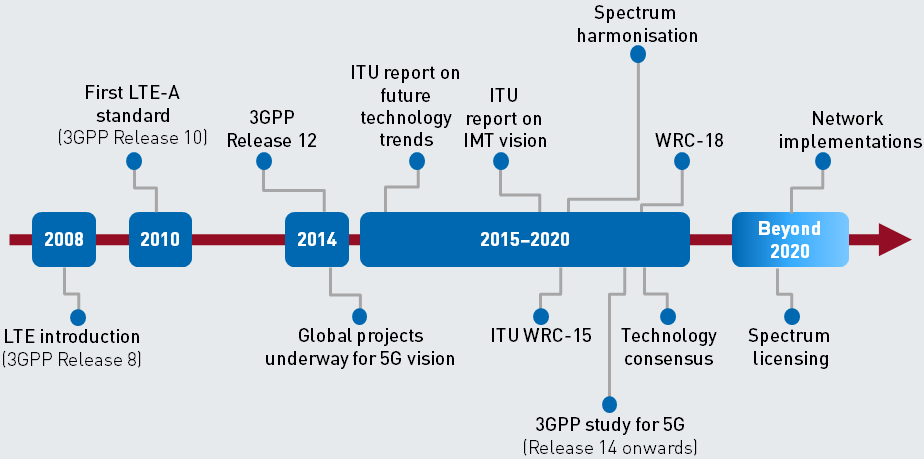
by Olayinka Oduwole
The Executive Vice Chairman of NCC (Nigerian Communications Commission) recently reported that Nigeria would be ready to roll out 5G networks in 2020 by making spectrum within the 26GHz, 38GHz and 42 GHz available. The EVC also noted that the Commission was working to address issues related to spectrum, infrastructural deficit and regulation to facilitate the roll out of 5G. In this piece, I would address these three issues raised by the Commission in preparing the country for the release of 5G.
The Nigerian Communications Commission (NCC) has said Nigeria would be ready to roll out 5G networks with the 26GHz, 38GHz and 42GHz spectrum bands by 2020.
The Executive Vice Chairman of NCC, Prof. Umar Danbatta, said this in Abuja Thursday during a collaborative meeting with GSMA for 5G rollout in Nigeria.
According to him, trial testing of the rollout plan has commenced in the country beginning with the Eko Atlantic Project, where broadband data will drive connectivity and allow humans to interact with connected devices to check their health status and remotely control home appliances without physical contact.
SPECTRUM
In my previous piece on 5G, I noted the vital role of spectrum availability in driving 5G penetration within any country. Whilst this is a positive step in the right direction, it’s equally important for the Commission to ensure that the new spectrum within the various bands are not offered at exorbitant prices. As noted by GSMA, spectrum pricing in developing countries, are on average more than three times higher than in developed countries, after taken into considering the income levels within the country. Making spectrum available at reasonable prices would encourage competition which would enable new market players as well as telcos to afford the new spectrum. Besides, 5G is expected to usher in new market players due to the various use cases within other industries. And the timely release of affordable spectrum would also help drive down the costs of data and other telecommunication services which would no doubt greatly benefit consumers within the country.
Tekedia Mini-MBA edition 16 (Feb 10 – May 3, 2025) opens registrations; register today for early bird discounts.
Tekedia AI in Business Masterclass opens registrations here.
Join Tekedia Capital Syndicate and invest in Africa’s finest startups here.

INFRASTRUCTURE
As I have noted, 5G requires huge investment to strengthen the capacity of the physical layer, virtualization of the core and for the high capacity backhaul networks needed to provide low latency, high speed connectivity and ubiquitous coverage promised for the various use cases. Besides, 5G may rely on the use of heterogeneous networks which would require network of different layers and of different technologies to work together in a seamless manner. Whilst the Commission has done right in pointing out the need to address infrastructural deficit, it also needs to understand that different players would need to work together to address this infrastructural challenge, hence facillating interoperability among players would be vital here.
REGULATION
I cannot over emphasize the importance of regulations in facillating the release and deployment of 5G. This is because regulations can either accelerate or hinder development within this ecosystem. The Commission mentioned that it would rely on existing policies and then develop new policies to address hiccups. I think this is a good strategy but it is important for the commission to begin to prepare to tear its existing rule book. This is because there are disruptions happening in every part of the 5G landscape that it would be hard to apply the previous rules. For example, in previous generations, it is very typical for a single Mobile Network Operator (MNO) to own and operate the entire network. With the advent of 5G, it is possible to have different operators (MNO or Mobile Virtual Network Operator MVNO) owning and operating different slices within the same network.
TRIAL
The commission also highlighted that trials will be performed using the Eko Atlantic project to demonstrate interaction between humans and machines for applications in smart home, health care etc., I think the Commission can achieve even greater results by partnering with local institutions within the country to develop innovation/research hubs as is the case in developed countries. Such hubs can allow startups within the country working on internet of things (iot) projects or machine to machine (m2m) applications etc. to test their projects. This would also drive entrepreneurial activity within this space, contribute greatly to the economic development of the country and foster collaboration between the academic community and industries.
Whilst I eagerly anticipate the release of 5G spectrum in Nigeria, I am of the opinion that deployment may take longer and predict around 2025 before it matures in Nigeria. I however may be wrong but will wait to find out.


